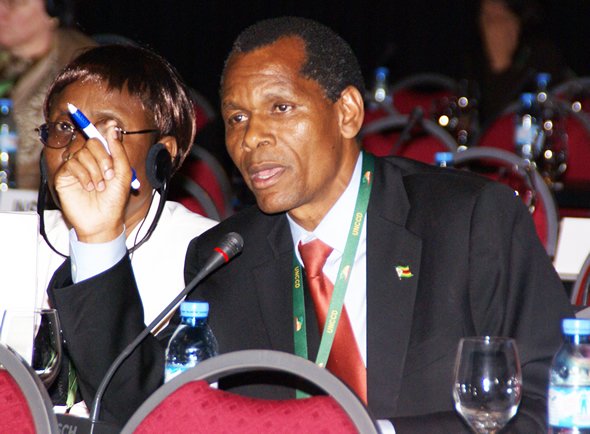Government is probing an unspecified but widespread number of indigenisation plans submitted before it after it emerged some locals were being used as fronts by foreign companies and had been paid off for fake equity, Indigenisation and Economic Empowerment Minister, Francis Nhema has said.
Nhema told a National Business Council of Zimbabwe (NBCZ) symposium in Harare on Monday that indigenous people were rejecting business shares from foreign firms operating in reserved sectors of the economy, demanding once-off payments for signatures to fake indigenisation plans.
He warned local people against being used as 'fronts'. A front can be a business or person serving as a respectable cover for another, usually in a criminal fashion.
"We have started investigating some names given to us as partners after realising that most people are being paid for signatures.
"I had one woman in my office who was paid $10 000 for a signature in a fake indigenisation plan that was submitted to us. I asked her what was really happening; she said she was given money to be a partner in business.
"Then I asked the firm's owner who said he gave her money to be his partner because she refused the 10% stake in the business opting to be given money.
"I didn't ask the lady where the money was because I knew it was no longer there, the only thing that was left was to send her to prison. We don't want such a thing, desist from that," Nhema said.
While the minister used an example of the sectors reserved for indigenous, he said the deception cut across all sectors of the economy.
He said senior government officials should not operate in reserved sectors saying there were meant for ordinary people.
"We don't need to see my friend (here) Gershem Pasi or Mai Pasi operating a hair salons or a bottle store, or hear that he is doing airtime wholesale and is employing 15 young boys! No, the sector is for the ordinary people.
"Leave those sectors for our ordinary people who were not fortunate enough to go to universities to attain degrees, and those people from vocational institutions," he said.
Nhema said indigenisation was like Christianity, where everyone is equal before God and needs to get equal opportunities.
Retail and wholesale businesses among them barbershops, hairdressing and beauty salons, bakeries, employment agencies and grain milling companies are reserved for local people under the indigenisation programme.
The other reserved sectors of the economy where foreigners can not invest are agriculture (primary production of food and cash crops), transportation, estate agencies, tobacco grading and packaging, tobacco processing, advertising agencies, milk processing and provision of local arts and crafts, marketing and distribution.
The National Indigenisation and Economic Empowerment Board said by February, 1 311 compliance applications had been received on reserved sectors of the economy with only 578 compliance certificates issued.
Under the country's economic empowerment law, all foreign owned firms must give at least 51% equity to locals and those that fail to comply risk losing their trading licenses or legal action.
- Zim Mail
 OK Zimbabwe posts US$17,8 million loss
OK Zimbabwe posts US$17,8 million loss  Hichilema meets Chivayo
Hichilema meets Chivayo  Millions celebrate Diwali festival in India
Millions celebrate Diwali festival in India  Econet Zimbabwe to delist from ZSE
Econet Zimbabwe to delist from ZSE  Gold edges up as traders await guidance
Gold edges up as traders await guidance  Mnangagwa fires Chitando, appoints Polite Kambamura
Mnangagwa fires Chitando, appoints Polite Kambamura  Young Investment Professional (YIP) Graduate Programme 2019
Young Investment Professional (YIP) Graduate Programme 2019 











 Young Investment Professional (YIP) Graduate Programme 2019
Young Investment Professional (YIP) Graduate Programme 2019
Editor's Pick